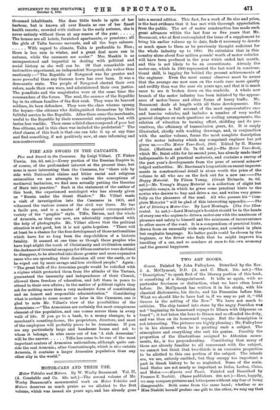FIRE AND SWORD IN THE CAUCASUS.
Fire and Sword in. the Caucasus. By Luigi Yuan. (T. Fisher Unwin. 10s. 6d. net.)—Every portion of the Russian Empire is, of course, of the profoundest interest at the present time, but none is more interesting than the Caucasus, for "there side by side with Nationalist claims and bitter racial and religious animosities we see attempts to realise the conceptions of mediaeval barbarism, we find men actually putting the theories of Marx into practice." Such is the statement of the author of this book, the experienced sociologist who has already given us "Russia under the Great Shadow." Mr, Villari made a visit of investigation into the Caucasus in 1905, and witnessed the various scenes of the civil war there. He has a facile pen, and is a master of the special correspondent's variety of the "graphic" style. Tiflis, Batnm, and the whole of Armenia, as they are now, are admirably reproduced with the help of photographs. Mr. Villari allows that the political situation is not good, but it is not quite hopeless. "There will at least be a chance for the free development of those nationalities which have for so long been the step-children of a historic fatality. It seemed at one time as though these peoples who have kept alight the torch of Christianity and civilisation amidst the darkness of Oriental savagery for fifteen centuries were destined to disappear, to be absorbed into those greater and more expansive races who are spreading their dominion all over the earth, or to be wiped out by more savage and less civilised people." Again : "The great bulk of the Armenian people would be satisfied with a regime which protected them from the attacks of the Tartars, guaranteed the immunity and independence of their Church, allowed them freedom of education, and left them in peace to attend to their own affairs; in the matter of political rights they ask for nothing more than a very moderate form of constitution and an honest and responsible administration." Considering what is certain to come sooner or later in the Caucasus, one is glad to note Mr. Villari's view of the possibilities of the Armenians:—" The Armenians are certainly the most conspicuous element of the population, and one comes across them in every walk of life. If you go to a bank, to a money changer, to a merchant's counting-house, the proprietors, directors, and most of the employees will probably prove to be Armenians. If you see any particularly large and handsome house and ask to whom it belongs, in nine cases out of ten 'A rich Armenian'
will be the answer Tiflis has come to be one of the most important centres of Armenian nationalism, although quite out- side the real Armenia ; after Constantinople, which is also outside Armenia, it contains a larger Armenian population than any other city in the world."






























































 Previous page
Previous page